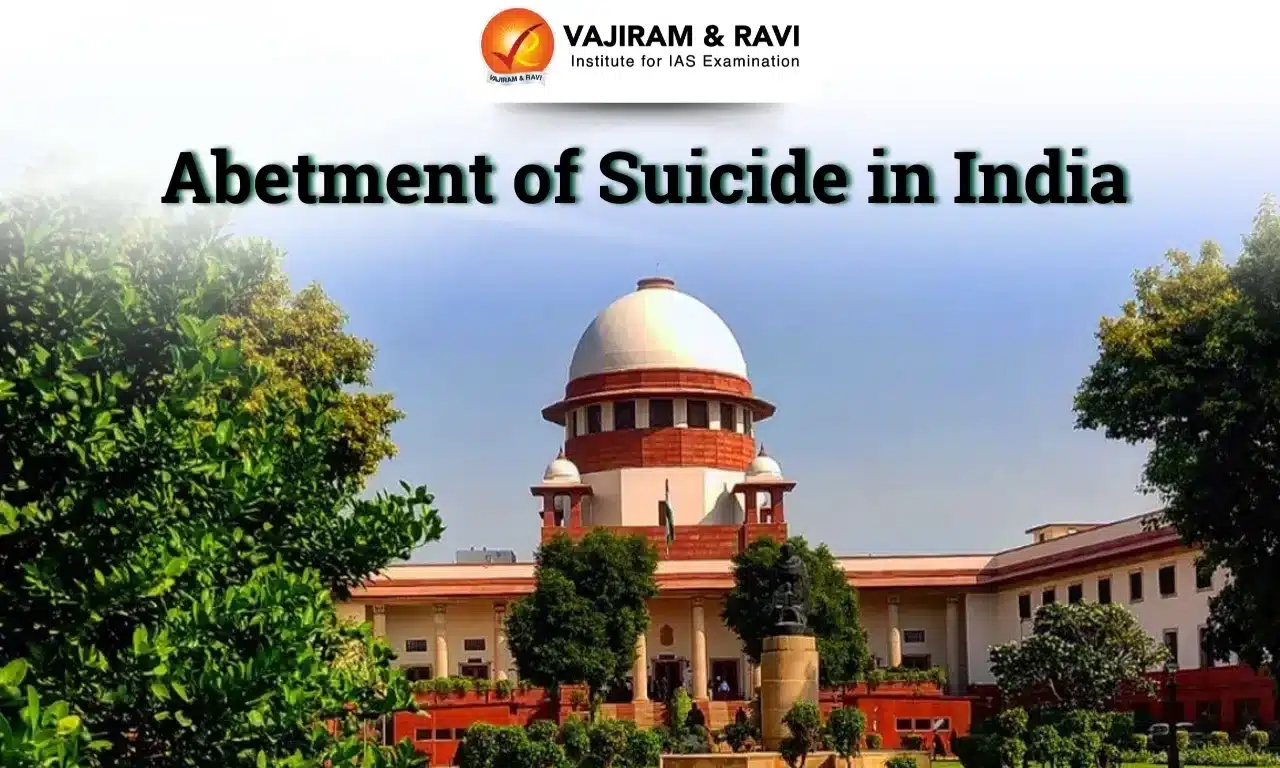What’s in today’s article?
- Why in News?
- Abetment of Suicide in Criminal Law
- Standard for Abetment of Suicide
Why in News?
The Supreme Court stressed the need to sensitize investigation agencies and courts regarding cases under Section 306 of the Indian Penal Code, 1860 (IPC), which deals with abetment of suicide.
A Bench comprising Justices Abhay S. Oka and K.V. Viswanathan highlighted that misuse of the provision should be avoided and called for adherence to legal principles laid down by the court.
The Bench emphasized that while genuine cases meeting the legal threshold should be prosecuted, the provision should not be misused to appease the grieving families of the deceased.
The remarks were made while acquitting a bank manager accused of abetting the suicide of a borrower who allegedly took his life due to an inability to repay loans. The court cautioned against baseless prosecutions that could lead to abuse of the legal process.
Abetment of Suicide in Criminal Law
- Definition of Abetment
- Under Section 107 of the IPC (equivalent to Section 45 of the Bharatiya Nyaya Sanhita (BNS), 2023), abetment involves:
- Instigating a person to perform an act.
- Conspiring with others to commit an act.
- Intentionally aiding an act through action or illegal omission.
- To prove abetment of suicide, it must be demonstrated that the accused directly instigated or aided the deceased in taking their life.
- Under Section 107 of the IPC (equivalent to Section 45 of the Bharatiya Nyaya Sanhita (BNS), 2023), abetment involves:
- Punishment for Abetment of Suicide
- Abetment of suicide is an offence tried in a Sessions court and is cognizable, non-bailable and non-compoundable in nature.
- As per Section 306 of the IPC (equivalent to Section 108 of the BNS):
- Imprisonment: Up to 10 years.
- Fine: Additional monetary penalty.
- Conviction Rates for Abetment of Suicide
- According to the National Crime Records Bureau (NCRB) 2022 data:
- Conviction rate for Section 306 IPC: 17.5%.
- Overall conviction rate for all IPC crimes: 69.8%.
- Conviction rate for cognizable offences (including abetment of suicide): 54.2%.
- This highlights a relatively low conviction rate for abetment of suicide compared to other crimes.
- According to the National Crime Records Bureau (NCRB) 2022 data:
Standard for Abetment of Suicide
- Supreme Court’s October 2024 Judgment
- The Supreme Court quashed a case of abetment of suicide where a salesperson died by suicide due to alleged workplace harassment related to a voluntary retirement scheme.
- The court emphasized avoiding “unnecessary prosecutions” in workplace-related suicide cases.
- The court highlighted that:
- A higher bar of proof is required in cases where the relationship between the deceased and the accused is official (e.g., employer-employee).
- Evidence must show the accused intended to cause the suicide.
- The prosecution must demonstrate direct and alarming incitement or encouragement by the accused.
- Supreme Court Precedents on Abetment of Suicide
- M Mohan v. The State (2011)
- Proof requires an active or direct act by the accused that leaves the deceased with no option but suicide.
- The act must be intended to push the deceased into this position.
- Ude Singh v. State of Haryana (2019)
- There must be proof of direct or indirect incitement to the act of suicide.
- However, if continuous acts or conduct by the accused create a situation where the deceased sees no other option, it may fall under Section 306 IPC.
Q.1. What is the law for abetment of suicide in India?
Abetment of suicide is governed by Section 306 IPC (or Section 108 BNS) and involves instigating, aiding, or conspiring in the act of suicide.
Q.2. What is Section 108 abetment to suicide?
Section 108 of the Bharatiya Nyaya Sanhita (BNS) is equivalent to Section 306 IPC, outlining punishments for those proven to instigate or aid suicide.
Q3.What is the punishment for suicide in India?
Abetment of suicide is punishable by up to 10 years of imprisonment and a fine under Section 306 IPC.
Q4. Is abetment of suicide bailable?
No, abetment of suicide is a non-bailable, cognizable, and non-compoundable offence tried in Sessions Court.
Q5. What is an example of abetment of suicide?
An example includes continuous harassment by an employer, as noted in Supreme Court cases, leading the victim to see no option but suicide.
Last updated on June, 2025
→ UPSC Notification 2025 was released on 22nd January 2025.
→ UPSC Prelims Result 2025 is out now for the CSE held on 25 May 2025.
→ UPSC Prelims Question Paper 2025 and Unofficial Prelims Answer Key 2025 are available now.
→ UPSC Calendar 2026 is released on 15th May, 2025.
→ The UPSC Vacancy 2025 were released 1129, out of which 979 were for UPSC CSE and remaining 150 are for UPSC IFoS.
→ UPSC Mains 2025 will be conducted on 22nd August 2025.
→ UPSC Prelims 2026 will be conducted on 24th May, 2026 & UPSC Mains 2026 will be conducted on 21st August 2026.
→ The UPSC Selection Process is of 3 stages-Prelims, Mains and Interview.
→ UPSC Result 2024 is released with latest UPSC Marksheet 2024. Check Now!
→ UPSC Toppers List 2024 is released now. Shakti Dubey is UPSC AIR 1 2024 Topper.
→ Also check Best IAS Coaching in Delhi
























